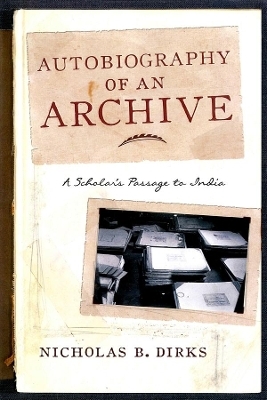
Autobiography of an Archive
Columbia University Press (Verlag)
978-0-231-16966-0 (ISBN)
- Lieferbar (Termin unbekannt)
- Versandkostenfrei
- Auch auf Rechnung
- Artikel merken
The decades between 1970 and the end of the twentieth century saw the disciplines of history and anthropology draw closer together, with historians paying more attention to social and cultural factors and the significance of everyday experience in the study of the past. The people, rather than elite actors, became the focus of their inquiry, and anthropological insights into agriculture, kinship, ritual, and folk customs enabled historians to develop richer and more representative narratives. The intersection of these two disciplines also helped scholars reframe the legacies of empire and the roots of colonial knowledge. In this collection of essays and lectures, history's turn from high politics and formal intellectual history toward ordinary lives and cultural rhythms is vividly reflected in a scholar's intellectual journey to India. Nicholas B. Dirks recounts his early study of kingship in India, the rise of the caste system, the emergence of English imperial interest in controlling markets and India's political regimes, and the development of a crisis in sovereignty that led to an extraordinary nationalist struggle.
He shares his personal encounters with archives that provided the sources and boundaries for research on these subjects, ultimately revealing the limits of colonial knowledge and single disciplinary perspectives. Drawing parallels to the way American universities balance the liberal arts and specialized research today, Dirks, who has occupied senior administrative positions and now leads the University of California at Berkeley, encourages scholars to continue to apply multiple approaches to their research and build a more global and ethical archive.
Nicholas B. Dirks is the chancellor of the University of California, Berkeley, where he is also a professor of history and anthropology. An internationally renowned historian and anthropologist, he is known for his work on the history of kingship and the institution of caste in India, as well as for his writing on the British empire. His major works include The Hollow Crown: Ethnohistory of an Indian Kingdom; Castes of Mind: Colonialism and the Making of Modern India; and The Scandal of Empire: India and the Creation of Imperial Britain. He has edited several books, including Colonialism and Culture, Culture/Power/History: A Reader in Contemporary Social Theory, and In Near Ruins: Cultural Theory at the End of the Century.
Acknowledgments Introduction: Passage to India Part I. Autobiography 1. Annals of the Archive: Ethnographic Notes on the Sources of History 2. Autobiography of an Archive 3. Preface to the Second Edition of The Hollow Crown Part II. History and Anthropology 4. Castes of Mind 5. Ritual and Resistance: Subversion as a Social Fact 6. The Policing of Tradition: Colonialism and Anthropology in Southern India Part III. Empire 7. Imperial Sovereignty 8. Bringing the Company Back In: The Scandal of Early Global Capitalism 9. The Idea of Empire Part IV. The Politics of Knowledge 10. In Near Ruins: Cultural Theory at the End of the Century 11. G. S. Ghurye and the Politics of Sociological Knowledge 12. South Asian Studies: Futures Past Part V. University 13. Franz Boas and the American University: A Personal Account 14. Scholars and Spies: Worldly Knowledge and the Predicament of the University 15. The Opening of the American Mind Notes Permissions Index
| Reihe/Serie | Cultures of History |
|---|---|
| Verlagsort | New York |
| Sprache | englisch |
| Maße | 152 x 229 mm |
| Themenwelt | Sachbuch/Ratgeber |
| Geisteswissenschaften ► Archäologie | |
| Geisteswissenschaften ► Geschichte ► Geschichtstheorie / Historik | |
| Geisteswissenschaften ► Geschichte ► Regional- / Ländergeschichte | |
| Geschichte ► Teilgebiete der Geschichte ► Kulturgeschichte | |
| Sozialwissenschaften ► Politik / Verwaltung | |
| ISBN-10 | 0-231-16966-3 / 0231169663 |
| ISBN-13 | 978-0-231-16966-0 / 9780231169660 |
| Zustand | Neuware |
| Haben Sie eine Frage zum Produkt? |
aus dem Bereich


